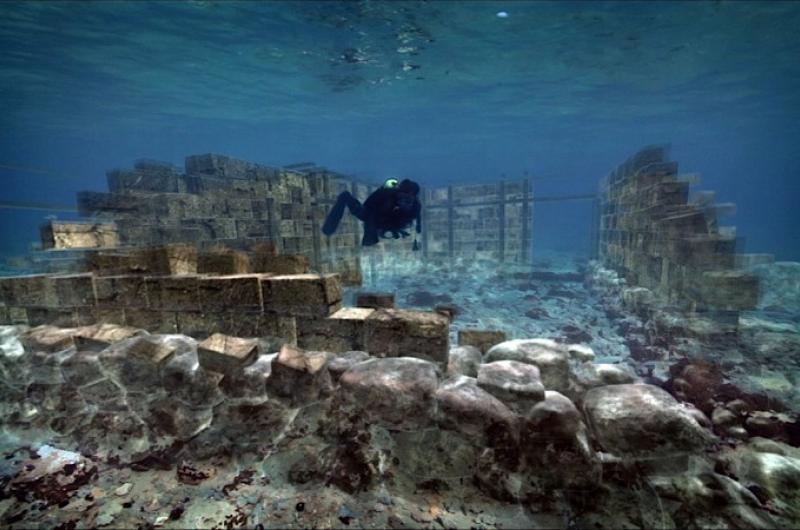
October 14, 2015, by Jon Henderson
Finding Atlantis
I’m just about to give a lecture to the first year on the subject of Atlantis and it reminded me of something that happened a few years ago when I appeared as a guest on the BBC Breakfast sofa.
I did three live five minute interviews in the studio each hour in the ten minute slot just before the news. I was there to talk about my project at Pavlopetri in Greece, working on the oldest submerged town in the world. The only thing I could think about in the run up to the live segments was my colleagues watching and hoping that I didn’t make a glaring factual error. The first two segments went very well and I was beginning to get into the swing of things. In the few minutes prior to my final interview I was talking off-camera to Charlie Stayt, the presenter, about my work. He asked me whether the site I was working on was Atlantis. I explained that it wasn’t and joked that I hoped that he wouldn’t ask me that on camera as it could ruin my academic career. Of course, as a good journalist, Charlie recognised a story and despite his assurances immediately followed to then ask me live on air to tell him about Atlantis. Hiding my horror I came up with an answer explaining that Atlantis was a myth but that the fact of ancient submerged cities in the Mediterranean was very real.
A number of people commented on my response to this question after the broadcast and actually it seems to have been the element that spurred the most public interest. Far from being a negative experience the question made me realise that rather than avoid them, it is better to deal with popular though flawed scientific beliefs head on and in fact they can help make the truth of what you are trying to communicate clearer.

CGI reconstruction of the submerged remains at Pavlopetri, Greece
The Atlantis story is an allegory; Plato’s intention writing in the 4th century BC, was to draw out a series of moral lessons in his imaginary dialogues – the Timaeus and the Critias. In these dialogues the ultimately lawful men of self-discipline and moderation (the Athenians) triumph over men of pride and presumption (the Atlanteans). Essentially the tale is a lesson for the Athenians (who were an expanding maritime empire at the time) not to behave like the fictional Atlanteans and have their potential greatness doomed by arrogance and hubris. It was never supposed to have been taken as historic fact. Even Plato’s pupil Aristotle thought Atlantis never existed. There was no ‘Atlantis’ and as a result it can never be found!
On saying that submerged ancient cities DO exist in the Mediterranean. When I tell people I work on sunken cities many of them think I’m joking. Because of Atlantis and its association with New Age ideas and science fiction many people assume seem ALL ideas of sunken ancient remains must be made up.
As is often the case the reality of the past is more fascinating that the fiction. There are hundreds of submerged cities around the world and we are only just beginning to discover what they have to tell us about the prehistoric human past.
If you are interested you can see my answer to Charlie’s question (and my look of horror!) here. Fast forward to 2.40 minutes in.
https://mediaspace.nottingham.ac.uk/media/Dr+Jon+Henderson%2C+University+of+Nottingham/0_775ylkst

Happy to visit and read the article on your website, in wait for his latest article. Continues to present good articles . . .
look at greenland, on its western side is canada, there it a giant 120 degree angle line along its shore, move greenland up north and you notice greenlands western shore becomes the north 120 degree angle, moving the continents back together, the other 120 degree angles appear at norways western shore and newfoundlands northern shore. I found this while researching the newly discovered shape of gravity (6 sided pyramid, or bipyramid) . 60 degrees on the other side of the north pole, I then found a 2nd hexagon in the north of Japan, which would be an even older north pole. Every planet and moon has a geographic hexagon on their north polarity because of the electromagnetism of gravity acting on the atoms through the planets. hexagons are found in spiral galaxies, crators, hurricanes, giants causeway, nebula black shapes, even the sun, gravitational lensing by galaxies, orbiting trojan/lagrange 60 degree angles intersections. I hope this helps.
Sunken because of Noah’s flood would make since to me sunken cities should not be deemed unbelievable.
This is what I want to do for my life. And once decided, I will never give up. No matter to get the diving license, rich my field experience or whatever.